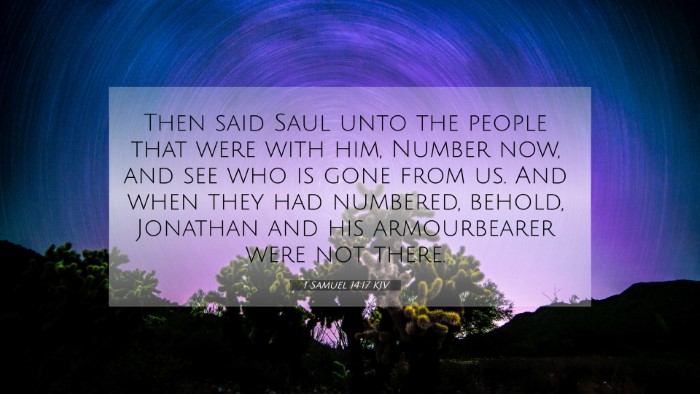Understanding 1 Samuel 14:17
Bible Verse: 1 Samuel 14:17
In this passage, Saul commands his men to gather and assess the situation during a critical moment in Israel's battle against the Philistines.
Summary of the Verse
This verse serves as a pivotal moment in the narrative of Saul’s kingship. It highlights the urgency of leadership in battle and the importance of accountability among the troops.
Commentary Insights
Insights from Matthew Henry
Matthew Henry emphasizes the significance of Saul's leadership and the critical moment he faces. He reflects on how leadership during conflict requires not just courage but also a clear strategy and the input of one’s officers. Henry notes that Saul was concerned about the apparent confusion among the people, which reflects on his ability to unify and direct his troops during turmoil.
Insights from Albert Barnes
Albert Barnes focuses on the lack of decisive action that can lead to disaster in times of war. He interprets Saul’s order as a necessary step to ensure that the men are mobilized effectively and that they understand the gravity of the situation. The moral duty of a leader is to rally their people when facing adversity. Barnes explains that this is a theme that recurs throughout the Scriptures, illustrating a leader's responsibility to strategize and take control.
Insights from Adam Clarke
Adam Clarke offers a linguistic and cultural context to the command issued by Saul. He elaborates on the type of leadership that Saul exemplifies, which involved not only issuing orders but also seeking the counsel and readiness of his men. Clarke underscores that a leader must be both authoritative and attentive to the needs and morale of their followers. The themes of unity and strategic planning resonate deeply within this narrative.
Cross References and Connections
Thematic connections within the Bible provide greater insight into this verse. Here are several related passages:
- 1 Samuel 14:1: Jonathan's attack on the Philistines demonstrates courage and initiative among leaders, parallel to Saul's later actions.
- 2 Samuel 10:1-5: Another battle narrative showcasing the importance of unity among Israelite leaders.
- Exodus 17:9-11: Moses’ command during the battle with Amalek illustrates leadership and the necessity for men to come together in times of crisis.
- 1 Corinthians 14:40: Paul emphasizes order in gatherings, reflecting on the need for strategic leadership in the church similar to Saul’s military context.
- Philippians 4:7: Guards our hearts and minds, suggesting the importance of mental readiness, paralleling the physical preparation in battle.
- 2 Kings 3:9-12: Collaboration among leaders when faced with a common enemy shows interdependence, akin to Saul’s appeal to his troops.
- Hebrews 10:24: Encouragement in gathering together, aligning with Saul's command to rally his men.
Thematic Bible Verse Connections
By examining 1 Samuel 14:17, one can explore deeper meanings related to:
- Leadership in Crisis: The importance of decisive action during tumultuous times.
- Unity Among Leaders: The necessity of collective effort for success, both in battles and in spiritual contexts.
- Preparation and Readiness: The moral and tactical readiness required for overcoming adversaries.
- Accountability: Saul’s directive seeks to hold his men accountable in their roles.
Tools for Bible Cross-Referencing
For those looking to explore additional connections and meanings in the Scriptures:
- Bible Concordance: Useful for finding words and phrases throughout the Bible.
- Bible Cross-Reference Guide: A key resource for studying interconnected scriptures.
- Cross-Reference Bible Study: Engaging in methods that promote understanding through thematic connections.
How to Use Bible Cross-References
Utilizing a cross-reference system effectively can enhance your study:
- Identify key themes in a specific verse.
- Locate other scriptures that address similar themes or ideas.
- Build a comparative analysis to understand varying contexts and teachings.
Conclusion
1 Samuel 14:17 is a reminder of the essential role of leadership and the responsibility that comes with it in both spiritual and worldly endeavors. The understanding of this verse combines lessons on unity, readiness, and strategic action that are as relevant today as they were in ancient times.


